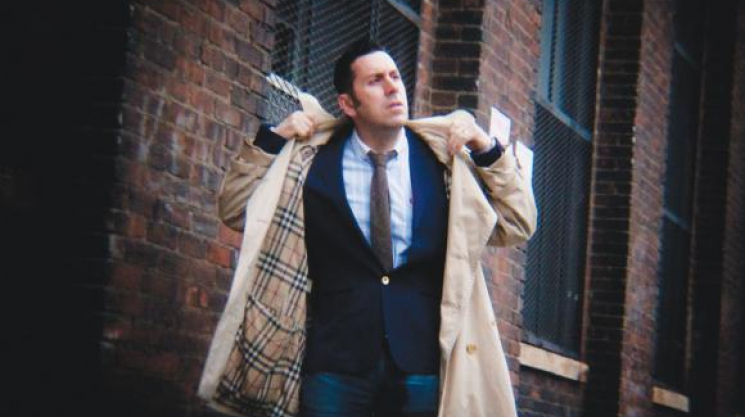
Sun, 03/02/2014 - 20:08 by Natasha Neale
If art is the best barometer of a civilization’s condition, our neighbours south of the border may have learned more tuning into a New York radio station than during last month’s state of the union address. With some luck, they might’ve caught a song from The Secret History’s Americans Singing in the Dark. The album is a literary work in indie pop packaging, and songwriter-in-chief Michael Grace Jr. is far from finished with the nation that has become his muse. For ION, Kate Shepherd finds out why the next chapter in the great American novel could be written by a band that, until now, has had little to say about the country it calls home.
Coming off a summer of shows at England’s Indietracks Festival, alongside Camera Obscura and The Pastels, and a hometown appearance at the NYC Pop Fest, the oft-buzzed (if not widely known) The Secret History is a band that knows the importance of both timing and balance. Despite the notable gigs and consistent critical praise, Grace admits that juggling jobs, projects, and the schedules of numerous members, has demanded a pragmatism that flies in the face of the typical touring lifestyle.
“We had a handful of really amazing shows, but in the end it requires a bit more constant playing to get as much mileage out of a record as you want to,” he says. “We were lucky to get some radio play, and to play some special shows, but particularly when you’re playing in more of a guitar-based band, you sort of want to play often and loudly."
With lead vocalist Lisa Ronson (daughter of mythic guitarist, Mick) back in London for the foreseeable future, and new projects beckoning, the dawn of 2014 seemed as good a time as any to take a breather from The Secret History. With five years’-worth of concepts for recordings of a more danceable, electronic bent calling for attention, Grace was ready to turn his efforts to setting a more twilit scene for the characters he’s introduced in previous outings. First, though, fans of My Favorite (Grace’s previous band) will get a chance to revisit one of the most stylistically prophetic works of the late nineties, when Cloudberry Records reissues its debut, Love at Absolute Zero, early this year.
“It’s an opportunity to play some of that older stuff, to sort of reinvent it around some newer sounds and rhythm ideas, and to just reclaim a style that I naturally drifted away from,” Grace says of his imminent return to My Favorite.
With their driving instrumentation, emotive vocals and sweeping, yet intimate sound, The Secret History’s two LPs earned deserved comparisons to The New Pornographers, as well as endorsement from The Pains of Being Pure at Heart’s Kip Berman. It was a departure from the Brit Pop-inflected beats and detached vocal delivery that in many ways defined My Favorite’s catalogue, but the project (which retained most of the players from Grace’s previous band), has all the same lyrical sophistication and thoughtful execution of its predecessor. Their latest album is as broad in scope as it is stirring in tone, yet glides from scene to character-driven scene with a subtlety that belies the gravity of its themes. In short, it’s an album with the potential to excite more than just a corner of the indie pop world, but that’s not something its creators are counting on.
“I think we’ve earned the admiration of some really great fans as a consolation for not reaching a larger audience by being unlucky, or difficult, or both,” Grace says.
A combination of bad timing and personal upheaval meant that My Favorite missed the boat when the New York renaissance of the early aughts began launching careers. Even as the locally beloved band was beginning to play larger venues and attract the attention of tastemakers, the end of a long-term relationship between Grace and its lead singer forced the band’s disintegration just as it seemed poised to reach a larger audience.
“In some ways, there’s been sort of a curse that followed us around,” he says. “But at the same time, we never had to do things in a cynical way, and I think for some people that’s made what we’ve done kind of special.”
That sentiment manifests in fans, as ardent in their pursuit of Grace’s earliest works as they are his latest efforts. For years, the most curious of their number had whispered about an early My Favorite cassette, made when Grace was about 19, of which there were maybe 70 copies. Since their distribution in Long Island over a decade ago, tapes made as far away as the shadowy corners of Sweden, but never into the digital realm. It was only when Grace began to see them selling on eBay, for more than he’d like to pay, that he conceded to release some of his adolescent recordings more widely, despite understandable misgivings.
“Sometimes you’re safer when you’re 19 trying to do the Ramones than you are trying to do Bob Dylan or Roxy Music. We were definitely ambitious,” he says. “I’ve taken a deep breath and can accept that a few bad teenage couplets can hit the open market. It won’t ruin me.”
Many of those early projects, and subsequent My Favorite albums, were purposeful reactions against grunge, and the essentially U.S.-centric sound that pervaded the rock and pop of the nineties. However, after years looking across the pond for inspiration, Grace’s latest works have seen his gaze shift inward – that is, towards the country he calls home. On Americans Singing in the Dark, the eponymous nations’ collective dream may be alive, but it’s not particularly well. Populated by a melancholic cast of characters, each song is a nod to their unique conditions, linked at times only by the sense of struggle that seems to be the single constant in their lives.
The result is a haunting anthology, played out in a world where the cards seem to be stacked against them, and us. It’s no surprise, given the marriage of that tone and subject matter, that Grace cites songwriters from Morrissey to Springsteen among his influences for the album, while bringing plenty of personal perspective to the table.
“There’s a bunch of things that are coalescing around the 21st century, and it’s really hard to get a sense of what it’s actually becoming. There’s anxiety and angst, and there’s anger and confusion, even if it’s simmering under the DayGlo flare effect on Instagram,” he says. “I wanted to make a record about that, about people that are in that state of panic. That felt more real to me.”
His situation in New York City certainly lends itself to a cross-sectional examination of the rungs of American society, and his music thrives on its inherent tensions. His concept of the country resembles an illusory hall of mirrors, an image that lends itself to the murky atmosphere and nighttime scenarios into which he intends to drop his characters on My Favorite’s upcoming recordings.
“You see a lot of humanity up close,” Grace says. “It’s in everything that you see and everything that you do, that give and take between the penthouse and the gutter.”
As the schism between those neighbouring realities widens on a daily basis, it might be hard not to see the country’s condition as one beyond saving, but Americans… doesn’t allow for the luxury of despair. That’s not to say, however, that Grace believes its inequalities can be easily remedied, through government or otherwise.
“Solving America’s problems through American politics is a tough road,” he says with a sigh. “You can stare at that Illuminati eye and think there’s some secret way in. But when you’re at the bottom of the pyramid, you’re not a rock climber; you’re a slave.”
And while dialogue surrounding the ever-broadening base of that societal pyramid has increased, largely as a result of the Occupy movement, Grace knows that it will require more than the sincere words of songwriters, however resonant, to incite meaningful change. But that doesn’t mean they can’t help.
“When things are organized and people are singing about how everything is going perfectly, I want to find the loose screw in the scaffolding that will bring it all down,” he says. “That’s what excites me about art.”




Add comment